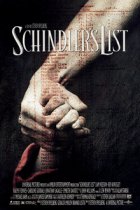
Schindler's List Page #13
STERN:
I somehow left my work card at home.
I tried to tell them it was a mistake,
but they --
Schindler silences him with a look. He's livid. Stern glances
down at the ground.
STERN:
I'm sorry. It was stupid.
(contrite)
Thank you.
Schindler turns away and heads for the car. Stern hurries
after him. They pass an area where all the luggage, carefully
tagged, has been left -- the image becoming BLACK and WHITE.
EXT./INT. MECHANICS GARAGE - NIGHT
Mechanics' hood-lamps throw down pools of light through which
me wheel handcarts piled high with suitcases, briefcases,
steamer trunks -- BLACK and WHITE.
Moving along with one of the handcarts into a huge garage
past racks of clothes, each item tagged, past musical
instruments, furniture, paintings, against one wall --
children's toys, sorted by size.
The cart stops. A valise is handed to someone who dumps and
sorts the contents on a greasy table. The jewelry is taken
to another area, to a pit, one of two deep lubrication bays
filled with watches, bracelets, necklaces, candelabra,
Passover platters, gold in one, silver the other, and tossed
in.
At workbenches, four Jewish jewelers under SS guard sift and
sort and weigh and grade diamonds, pearls, pendants, brooches
children's rings -- faltering only once, when a uniformed
figure upends a box, spilling out gold teeth smeared with
blood -- the image saturating with COLOR.
EXT. COUNTRYSIDE - DAY
Fractured gravestones like broken teeth jut from the earth
of a neglected Jewish cemetery outside of town. Down the
road that runs alongside it comes a German staff car.
In the backseat, Untersturmfuhrer Amon Goeth pulls on a flask
of schnapps. His age and build are about that of Schindler's;
his face open and pleasant.
GOETH:
Make a nice driveway.
The other SS officers in the car -- Knude, Haase and Hujar --
aren't sure what he means. He's peering out the window at
the tombstones.
EXT. GHETTO - DAY
The staff car passes through the portals of the ghetto and
down the trolley lines of Lwowska Street.
As the car slowly cruises through the ghetto, Knude, like a
tour guide, briefs the new man, Goeth --
KNUDE:
This street divides the ghetto just
about in half. On the right -- Ghetto
A:
civil employees, industry workers,so on. On the left, Ghetto B: surplus
labor, the elderly mostly. Which is
where you'll probably want to start.
The look Goeth gives Knude tells him to refrain, if he would,
from offering tactical opinions.
KNUDE:
Of course that's entirely up to you.
EXT. PLASZOW FORCED LABOR SITE - DAY
Outside of town, a previously abandoned limestone quarry
lies nestled between two hills. The stone and brick buildings
look like they've been here forever; the wooden structures,
those that are up, are built of freshly-cut lumber.
There's a great deal of activity. New construction and
renovation -- foundations being poured, rail tracks being
laid, fences and watchtowers going up, heavy segments of
huts -- wall panels, eaves sections -- being dragged uphill
by teams of bescarved women like some ancient Egyptian
industry.
Goeth surveys the site from a knoll, clearly pleased with
it.
But then he's distracted by voices -- a man's, a woman's --
arguing down where some barracks are being erected.
The woman breaks off the dialog with a disgusted wave of her
hand and stalks back to a half-finished barracks. The man,
one from the car, Hujar, sees Goeth, Knude and Haase coming
down the hill and moves to meet them.
HUJAR:
She says the foundation was poured
wrong, she's got to take it down. I
told her it's a barracks, not a
f***ing hotel, f***ing Jew engineer.
Goeth watches the woman moving around the shell of the
building, pointing, directing, telling the workers to take
it all down. He goes to take a closer look. She comes over.
ENGINEER:
The entire foundation has to be dug
up and re-poured. If it isn't, the
thing will collapse before it's even
completed.
Goeth considers the foundation as if he knew about such
things. He nods pensively. Then turns to Hujar.
GOETH:
(calmly)
Shoot her.
It's hard to tell which is more stunned by the order, the
woman or Hujar. Both stare at Goeth in disbelief. He gives
her the reason along with a shrug --
GOETH:
You argued with my man.
(to Hujar)
Shoot her.
Hujar unholsters his pistol but holds it limply at his side.
The workers become aware of what's happening and still their
hammers.
HUJAR:
Sir...
Goeth groans and takes the gun from him and puts it to the
woman's head. Calmly to her --
GOETH:
I'm sure you're right.
Translation
Translate and read this script in other languages:
Select another language:
- - Select -
- 简体中文 (Chinese - Simplified)
- 繁體中文 (Chinese - Traditional)
- Español (Spanish)
- Esperanto (Esperanto)
- 日本語 (Japanese)
- Português (Portuguese)
- Deutsch (German)
- العربية (Arabic)
- Français (French)
- Русский (Russian)
- ಕನ್ನಡ (Kannada)
- 한국어 (Korean)
- עברית (Hebrew)
- Gaeilge (Irish)
- Українська (Ukrainian)
- اردو (Urdu)
- Magyar (Hungarian)
- मानक हिन्दी (Hindi)
- Indonesia (Indonesian)
- Italiano (Italian)
- தமிழ் (Tamil)
- Türkçe (Turkish)
- తెలుగు (Telugu)
- ภาษาไทย (Thai)
- Tiếng Việt (Vietnamese)
- Čeština (Czech)
- Polski (Polish)
- Bahasa Indonesia (Indonesian)
- Românește (Romanian)
- Nederlands (Dutch)
- Ελληνικά (Greek)
- Latinum (Latin)
- Svenska (Swedish)
- Dansk (Danish)
- Suomi (Finnish)
- فارسی (Persian)
- ייִדיש (Yiddish)
- հայերեն (Armenian)
- Norsk (Norwegian)
- English (English)
Citation
Use the citation below to add this screenplay to your bibliography:
Style:MLAChicagoAPA
"Schindler's List" Scripts.com. STANDS4 LLC, 2025. Web. 20 Jan. 2025. <https://www.scripts.com/script/schindler's_list_135>.



Discuss this script with the community:
Report Comment
We're doing our best to make sure our content is useful, accurate and safe.
If by any chance you spot an inappropriate comment while navigating through our website please use this form to let us know, and we'll take care of it shortly.
Attachment
You need to be logged in to favorite.
Log In